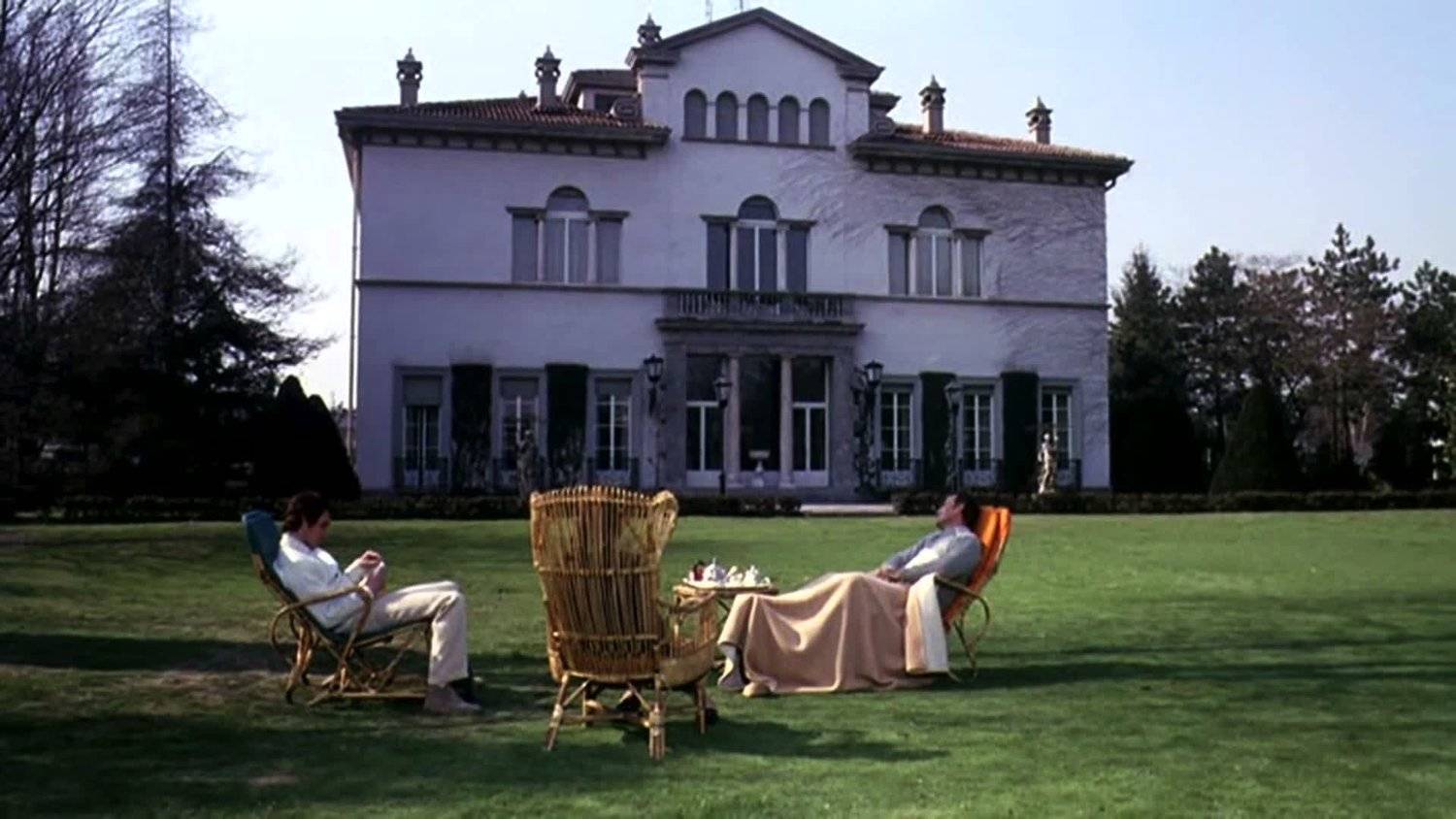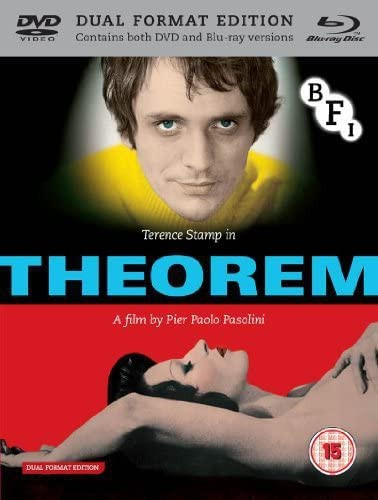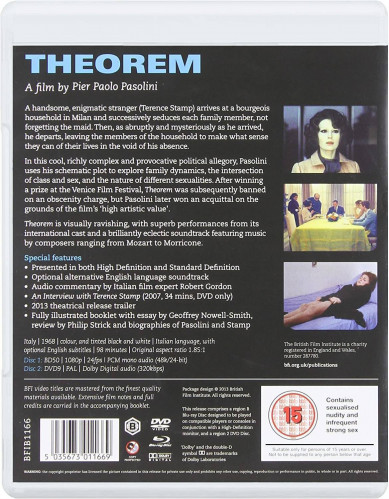THEOREM [1958 / 2013] [Blu-ray + DVD] [UK Release] ‘THEOREM’ Is An Overwhelming Shattering Experience! A Mysterious Powerful Film!
‘THEOREM’ is a film by Pier Paolo Pasolini.
A handsome, enigmatic stranger [Terence Stamp] arrives at a bourgeois household in Milan and successively seduces each family member, not forgetting the maid. Then, as abruptly and mysteriously as he arrived, he departs, leaving the members of the household to make what sense they can of their lives in the void of his absence.
In this cool, richly complex and provocative political allegory, Pier Paolo Pasolini uses his schematic plot to explore family dynamics, the intersection of class and sex, and the nature of different sexualities. After winning a prize at the Venice Film Festival, ‘THEOREM’ was subsequently banned on an obscenity charge, but Pier Paolo Pasolini later won an acquittal on the grounds of the films 'high artistic value.'
‘THEOREM’ is visually ravishing, with superb performances from its international cast and a brilliantly eclectic soundtrack featuring music by composers ranging from Ennio Morricone, Ted Curson, Wolfgang Amadeus Mozart and various other composers.
FILM FACT No.1: Awards and Nominations: 29th Venice Film Festival: Nominated: Golden Lion: Win: Volpi Cup: Best Actress for Laura Betti.
FILM FACT No.2: Teorem means theorem in Italian. Its Greek root is Theorem (θεÏŽρημα), meaning simultaneously "spectacle," "intuition," and "theorem." Maurizio Viano suggests that the film should be considered as "spectatorship" because each family member gazes at the guest and his loins [citation needed], although this seems unlikely: the Greek word denotes the object of spectatorship, rather than the actual act of spectatorship, which would be Theoresis (θεÏŽρησις). On its Italian release, ‘TEOREM,’ the religious right and the Vatican criticized the sexual content in the film. Others considered the film "ambiguous" and "visionary." The film won a special award at the Venice Film Festival from the International Catholic Film Office, only to have it withdrawn later when the Vatican protested. Scholars view the film differently due to the openness or ambiguity of the film. The author of “A Certain Realism: Making Use of Pier Paolo Pasolini’s Film Theory and Practice,” Maurizio Viano, says that in order to understand the film there must be "adequate translation." Most scholars writing about the film do not discuss Pier Paolo Pasolini 's cinematographic techniques but Pier Paolo Pasolini's philosophical arguments. Maurizio Viano argues that Pier Paolo Pasolini intended to be theoretical in this film because he wanted to be recognized as "a film theorist." Pier Paolo Pasolini later expanded this film into a novel with the same name. Giorgio Battistelli composed an opera based on the film. In 2009, the Dutch theatre company 'Toneelgroep Amsterdam' created and performed a play version of this film.
Cast: Silvana Mangano, Terence Stamp (The Visitor), Massimo Girotti, Anne Wiazemsky, Laura Betti, Andrés José Cruz Soublette, Ninetto Davoli, Carlo De Mejo, Adele Cambria, Luigi Barbini, Giovanni Ivan Scratuglia, Alfonso Gatto, Cesare Garboli (Interviewer) (uncredited) and Susanna Pasolini (Old Peasant) (uncredited)
Director: Pier Paolo Pasolini
Producers: Franco Rossellini and Manolo Bolognini
Screenplay: Pier Paolo Pasolini
Composer: Ennio Morricone
Cinematography: Giuseppe Ruzzolini (Director of Photography)
Image Resolution: Blu-ray: 1080p + DVD: 1080i
Aspect Ratio: 1.85:1
Audio: Italian: 2.0 LPCM Stereo Audio
English: 2.0 LPCM Stereo Audio
Subtitles: English
Running Time: 98 minutes
Region: Region B/2
Number of discs: 2
Studio: Euro International Film / BFI [British Film Institute]
Andrew's Blu-ray Review: There's something simultaneously infuriating and delightful about the situation explored in Pier Paolo Pasolini's 1968 film ‘THEOREM’ [Italian Title ‘TEOREM’]. The director Pier Paolo Pasolini teases the viewer with a proposition during the opening minutes of the film, shot documentary-interview style, in which he considers what would be the impact should a bourgeois owner of a factory give his business over into the hands of the workers. Would this now make the workers the new bourgeoisie? On the one hand, the apparent simplicity of the theorem's proposition and Pier Paolo Pasolini's testing of it seems either obscure or ludicrously reductive, the film detailing a stranger's interaction with a bourgeois family on one half of the equation with the result that their lives undergo a radical transformation in the second half. The film offers no explanation or justification for what occurs, but the manner in which it expresses its ideas is daring and intriguing, opening up many other possible interpretations.
Social change, personal development, freedom of artistic expression, sexual liberation and shattering of bourgeois values are all Pier Paolo Pasolini's targets, and like Jean-Luc Godard, particularly during this period, that revolution extends to the screen, breaking the format, defying expectations, playing the part of revolutionary, prophet and artist. The ultimate purpose of ‘THEOREM’ or its relative success may therefore be difficult to define, but its intent is at least is to challenge the viewer and force them to re-evaluate what they think they know and perhaps discover something new.
The Italian version of ‘TEOREM’ was given a special award by the International Catholic Film Office when it was shown at the Venice Film Festival in 1968. But the award was then withdrawn, and the film renounced by the Pope because it apparently did not respect the sensibility of the Christian people. These contradictory reactions sum up a film which seems by its very nature to embody opposites: the possibility of a supernatural transcendence is contemplated, yet all those who encounter it are left destroyed. Is the Visitor an angel or a devil? Do the reactions of the visited family, which seem to echo the forms of escape sought by many in late-sixties Europe, excoriate 20th century capitalism or are they merely the historically inevitable results of humanity's estrangement from its primal past? Such questions are raised by the film almost without our being fully aware of their presence in the mind, and many more half-formed disquietudes of the soul are seeded by its lyrical, visually intoxicating poetry. It also has worth as a late-sixties cultural time capsule, capturing urban and pastoral shades of a transforming Italy during a period of great cultural upheaval and uncertainty.
‘THEOREM’ was previously released by the British Film Institute on a PAL DVD disc only. ‘THEOREM’ has been upgraded to a dual-Format Blu-ray and DVD edition. The film is presented both on Blu-ray on a single-layer disc, and on a dual-layer DVD-9 disc. The Blu-ray is an encoded with 1080p and at 24fps.
THEOREM MUSIC TRACK LIST
Requiem KV 626 (Written by Wolfgang Amadeus Mozart) [Performed by Russian Academy Choir and Moscow Philharmonic Orchestra]
TEARS FOR DOLPHY (uncredited) (Written by Ted Curson)
L'ULTIMA CORRIDA (Written and arranged by Ennio Morricone) [Orchestra accompanied by I Cantori Moderni di Alessandro Alessandroni] [Conducted by Bruno Nicolai]
FRUSCIO Di FOGLIE VERDI (Composed and arranged by Ennio Morricone) (Lyrics by Audrey Nohra) [Performed by Trio Junior] [Orchestra conducted by Bruno Nicolai]
* * * * *
Blu-ray Image Quality – The quality of ‘THEOREM’ with the transfer was already high on the existing DVD release, so there might not be any major improvement evident here in its upgrade to High Definition. The Blu-ray has a better look and feel than of the DVD ‘THEOREM.’ Contrast is strong and there is not an exceptional amount of extra detail in the 1080p image. The deep blacks are certainly more accurately rendered, but there is still not a great amount of shadow detail. Colours have a cool, neutral, natural tone. A significant amount of exteriors however are shot during early mornings or evenings and the golden glow of the sunrises and sunsets come over well in the transfer. Some minor print wavering or flicker is evident and grain is visible, but nothing more than you would expect from a film of this age. Overall however, the image is remarkably clean and sharp, with only a few stray dust spots visible. Some compression blocking or noise reduction artefacts are evident, but there are only really detectable in freeze-frame. Subtitles: English subtitles are included, in a white font and they are clear throughout. Some minor interjections and phrases where the meaning is quite apparent are left un-translated. In a film where there is not a great deal of dialogue, there is a certain balance to maintain and it strikes me that it has been achieved here. All extra features are subtitled in English except for Robert Gordon's audio commentary, which is curious, as it was subtitled on the previous DVD only release of ‘THEOREM’ very strange. Please Note: Playback Region B/2: This will not play on most Blu-ray players sold in North America, Central America, South America, Japan, North Korea, South Korea, Taiwan, Hong Kong and Southeast Asia. Learn more about Blu-ray region specifications.
Blu-ray Audio Quality – The Italian 2.0 LPCM Stereo Audio track and the English 2.0 LPCM Stereo Audio track on the Blu-ray disc, as well as the on the DVD disc, does not exhibit a great dynamic range, but it is clear and has few problems with analogue noise. Surprisingly, while small sound effects are relatively clear, it is the music score that is most lacking, but this is probably down to the original mixing and source materials. In an addition to the original DVD release, the film's English dub is also included on the Blu-ray release. The dub obviously dates from the film's release and uses mainly American voice-actors for most of the cast, but presumably Terence Stamp speaks his own dialogue and he doesn't really have enough lines to be certain of this. Not surprisingly, considering the international casting and the way films were made in Italy at this time, the lip-sync in English is much better than the Italian version. It's clear that almost everyone, even the Italian actors, were actually delivering their lines in English here, and it was only dubbed afterwards into Italian. The quality of the English dub has some low-level background noise, but is generally fine and clear. I thought it worked perfectly well with the film.
* * * * *
Blu-ray Special Features and Extras:
Presented in both High Definition and Standard Definition
Optional alternative English language soundtrack
Audio Commentary by Italian film expert Robert Gordon: Italian film expert Robert Gordon presents a full and informative commentary for the film ‘THEOREM.’ It's often descriptive of what is happening on the screen, but at the same time interpretative and makes many interesting observations. Robert Gordon also takes the time to place the film in the context of Pier Paolo Pasolini's other films, as well as his writing, his life and his themes. It doesn't perhaps offer any new major illumination on the film's treatment than can be grasped by any viewer themselves, but Robert Gordon is a decent commentator and it's never dull or overly academic and well worth listening to.
Special Feature: An Interview with Terence Stamp [DVD only] [2007] [1080i] [1.78:1] [33:14] With this far-reaching interview with Terence Stamp and talks about Pier Paolo Pasolini’s ‘THEOREM’ film and is interviews by Rossana Capitano and Morgaine Gaye in London on the 10th July, 2007 and The Sound Company in London. In this simply delightful and fascinating interview with Terence Stamp, he reflects on what was an important period for him, liberating himself as an actor first for Frederico Fellini and then for Pier Paolo Pasolini before abandoning it all and going to live on an Ashram in India. The interview is edited down quite a bit and Terrence Stamp, as we've seen in some recent appearances, could talk for hours, but he is given plenty of time to develop his thoughts and stories about getting involved on this film specifically, working (or not, as it were) with Pier Paolo Pasolini, trying to figure out the man and his contradictions, as well as how he sees his own character in the film. This is a very frank and often a very funny interview, and Terence Stamp is totally mesmerising here and you could listen to him all day. The two women interviewers were the academic Rossana Capitano and Morgaine Gaye were quite bowled over when Terence Stamp speaks to them in pure Italian, especially when saying Thank you and enjoyed the interview very much.
Theatrical Trailer [1968] [1080p] [1.78:1] [1:26] This is the 2013 Original Italian Theatrical Trailer release for the film ‘THEOREM.’ [English Subtitles].
BONUS: The extras are rounded out nicely by the stunning and brilliant BFI [British Film Institute] fully illustrated 18 page booklet. First of all we get an essay entitled “Theorem” by Geoffrey Nowell-Smith. Next up we have “Theorem reviewed” by Philip Strick. Then there are two a fascinating Biographies entitled “Terence Stamp (1939-)” by Roma Gibson and “Pier Paolo Pasolini (1922-1975)” by Geoffrey Nowell-Smith. Then we have the complete credit listings of the film ‘Theorem.’ Then we have “Extras,” which is a short introduction to the “An Interview with Terence Stamp” [2007] [34:00] [DVD only]. Then finally we have information “About the transfer” and “Acknowledgments.”
Finally, Provocative, controversial, experimental, ‘THEOREM’ is definitely a product of its time, but such is Pier Paolo Pasolini's brilliance, his method of keeping the subject elusive and vague while at the same time simple and meaningful, that the film stands up very well today. The BFI [British Film Institute] High Definition dual-format upgrade doesn't really significantly improve on the previous DVD release, but this is still an impressive release with some good extra features that contribute to a fine appreciation of the film. This BFI [British Film Institute] package is a definite must for the student of 20th century cinema, providing the best possible reproduction of the movie and a host of enlightening, educational commentaries on it with the extras and booklet pieces. I totally recommended this beautiful BFI [British Film Institute] package, as they have done a stunning job and if you want to view a film that makes you think, then this will definitely be for you and I am so proud to have this in my Blu-ray Collection and if you feel this is not for you, well then you are really missing out on a truly stunning Pier Paolo Pasolini classic film of its time and now I am proud to have the ultimate version of this very provocative, controversial, experimental film. Highly Recommended!
Andrew C. Miller – Your Ultimate No.1 Aficionado
Le Cinema Paradiso
United Kingdom



